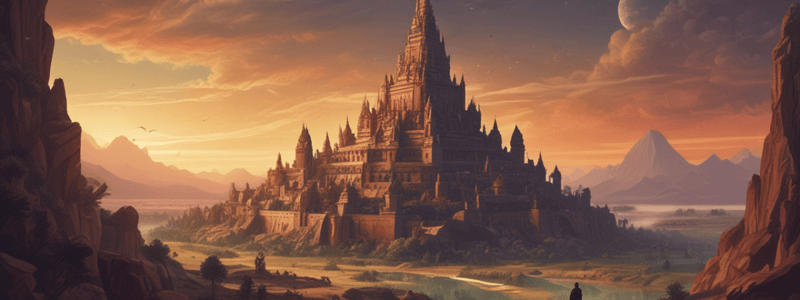Podcast
Questions and Answers
Which ancient civilization is credited with the invention of the wheel?
Which ancient civilization is credited with the invention of the wheel?
- Mesopotamia (correct)
- Ancient Egypt
- Ancient Rome
- Ancient Greece
What was the primary social and economic system in medieval Europe?
What was the primary social and economic system in medieval Europe?
- Socialism
- Feudalism (correct)
- Capitalism
- Communism
Which cultural and intellectual movement in Europe revived classical Greek and Roman ideas?
Which cultural and intellectual movement in Europe revived classical Greek and Roman ideas?
- Reformation
- Industrial Revolution
- Age of Exploration
- Renaissance (correct)
What was the primary result of the World Wars?
What was the primary result of the World Wars?
Who was a notable figure in the Protestant movement against the Catholic Church?
Who was a notable figure in the Protestant movement against the Catholic Church?
What was the transition from manual labor to machine-based manufacturing known as?
What was the transition from manual labor to machine-based manufacturing known as?
Flashcards are hidden until you start studying
Study Notes
Ancient Civilizations
- Mesopotamia:
- Located in present-day Iraq
- First urban civilization (c. 3500 BCE)
- Inventions: wheel, writing (cuneiform), governance (city-states)
- Ancient Egypt:
- Located in northeastern Africa
- Lasted from c. 3100 BCE to 30 BCE
- Contributions: pyramids, mummies, hieroglyphics, papyrus
- Ancient Greece:
- Located in southeastern Europe
- Lasted from c. 8th century BCE to 146 CE
- Contributions: democracy, philosophy (Socrates, Plato, Aristotle), theater, Olympics
Medieval Period
- Fall of the Roman Empire:
- Lasted from 5th to 15th century CE
- Marked the end of the Western Roman Empire
- Rise of Christianity:
- Spread throughout Europe during the Middle Ages
- Played a significant role in shaping European culture and politics
- Feudalism:
- Social and economic system in medieval Europe
- Characterized by lords, vassals, and serfs
Early Modern Period
- Renaissance:
- Cultural and intellectual movement in Europe (14th to 17th century)
- Revival of classical Greek and Roman ideas
- Notable figures: Leonardo da Vinci, Michelangelo, Galileo
- Age of Exploration:
- European exploration and colonization of the Americas (15th to 17th century)
- Notable explorers: Christopher Columbus, Vasco da Gama, Ferdinand Magellan
- Reformation:
- Protestant movement against the Catholic Church (16th century)
- Notable figures: Martin Luther, John Calvin, Henry VIII
Modern Period
- Industrial Revolution:
- Transition from manual labor to machine-based manufacturing (18th to 19th century)
- Significant economic and social changes
- World Wars:
- Global conflicts (1914-1918 and 1939-1945)
- Resulted in significant political and economic changes
- Cold War:
- Ideological and political rivalry between the United States and the Soviet Union (1945-1991)
- Characterized by proxy wars, espionage, and a nuclear arms race
Studying That Suits You
Use AI to generate personalized quizzes and flashcards to suit your learning preferences.




